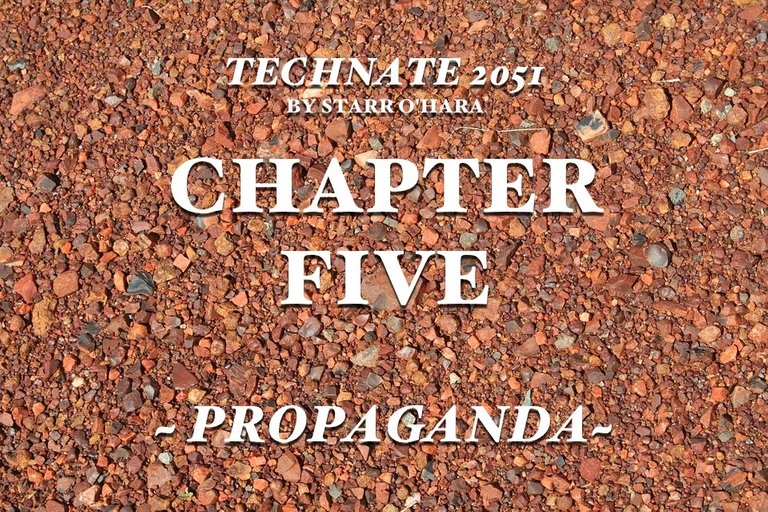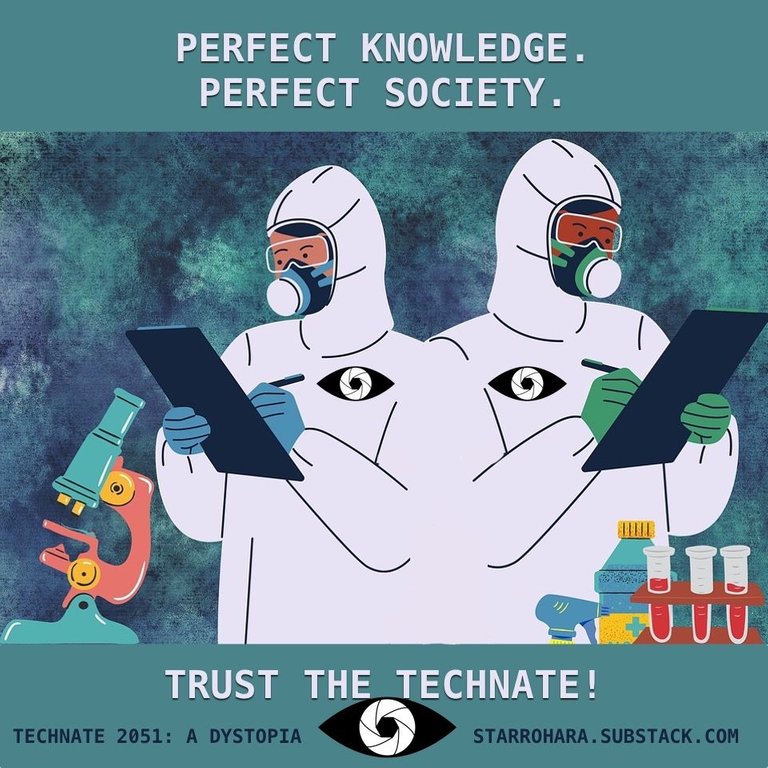Begin at Chapter One.
Go back to Chapter Four.

Rain poured from the sky outside Zappa’s window, sending rivulets coursing down the other side of the glass, making huge puddles on the street below.
Confident he wouldn’t fall this time, Zappa dragged his plastic desk chair over to the window and stood on it to get a better view. It was the first time he’d seen rain since he’d been at Tranquil Meadows, and it surprised him, though he wasn’t sure why. Maybe he’d subconsciously assumed that the dome of Charlanta’s protective skin would keep out precipitation, just as it kept out microbes and bats and people. But that made no sense. The nanites that composed the skin didn’t form a solid surface, and they weren’t absorbent. Liquid would seep in through the cracks. But then, how did the skin keep out the bacteria and spores and other contaminants that the raindrops must surely contain? It was a mystery. Maybe the robot doctor would know.
The green autonomous vehicles cruised by below, oblivious to the rain, each one with its Technate’s eye on the roof, watching. Occasionally the top of an umbrella could be seen bobbing along on the sidewalk. Zappa watched the progress of one of these umbrellas and wondered about the pedestrian hiding beneath it. Who were they? Where did they live? Where were they going? What was out there in the vast megacity of Charlanta for a person with no job, no responsibilities, no freedom, to do on a rainy day like this?
The umbrella stopped still in the middle of the sidewalk and tilted down, so that if Zappa weren’t so near-sighted, he might’ve been able to see the face of the person beneath it. He couldn’t make out the face, but he could tell that the person was staring at the big billboard screen across the way from his room. There was some kind of a news story being broadcast on it, with footage from a refugee camp.
Although Zappa couldn’t hear the dialogue, he knew the broadcast was crafted to inspire sympathy, because the refugees shown were mostly elderly, or women with small children. If they’d wanted to scare or anger the viewer, they would have shown strong, unkempt men in their prime. He knew this because as a young man, in the decade or so leading up to the takeover, he’d had a comprehensive (though informal) education in propaganda. Now his mind was forever honed to it in any media he happened upon, which was not much until lately. All messaging consisted of layers: there was the surface level truth, the messenger’s intent bubbling underneath, and the top dressing of implications, which might consist of misdirection, exaggeration, or outright lies. This was true of all media, but it was doubly true of anything put out by the Technate.
For this particular piece, the surface truth and the top dressing were clear enough. It was the intent behind it that posed the puzzle. Why would the Technate put out propaganda meant to create sympathy for feral refugees, when it had done such a swell job previously of making most people fear and hate ferals? Why put refugees at the very lowest rung of society—as workers, social pariahs, untouchables—and then go to such an effort to make people feel sorry for them? Maybe the Technate was short on workers and wanted to increase its feral slaveholdings. So, adjust public perception to make way for the dirty, diseased population boom.
He continued watching, his interest piqued. Maybe he could get a clue from it as to where the refugee center was, and how to get in—or how to get people out. He might even see Shen or what-was-his-name, the boyfriend. Mark.
A bird’s eye view of the camp facilities was displayed on the screen. The conditions were not deplorable, or at least what the broadcast chose to show was not: a neat grid of plastic-y looking huts, probably 3D-printed, surrounded a small communal space with picnic tables and a playground.
For the first time in his incarceration, out of many times that he’d stood and stared out the window at the screen across the way, Zappa wished he could hear the narration. But he didn’t have the equipment for it. He’d learned from Douglas that for large public display screens such as this one, the audio was broadcast directly into the viewer’s eardrums by means of an implant. So it wasn’t just oculars that kept the people of the Technate connected and distracted all the time; it was “auriculars” as well, along with a number of other attachments and upgrades for the brain that a habitator could qualify for if they kissed enough Technate ass.
The view changed to ground-level. A female correspondent sat at one of the picnic tables, an odd-looking woman with complexion nearly too luminous and eyes almost too big to be real. As she spoke, Zappa noticed other anomalies in her appearance. Her hair was dyed blue but when the camera zoomed in on her, he could see that the blue extended down onto the skin of her scalp. Her blouse did not wrinkle in the right places as she moved. She reminded Zappa of a cartoon, but a very realistic one. And, he realized, that must be what she was. They’d had, back in his young adulthood, what were called avatars: human-like illustrations that could be modified with different clothing, hair and skin colors, facial features, and accessories. People would use these avatars to identify themselves in online social platforms or on video games. This woman must be an advanced avatar, whether for a real person out there somewhere or for some AI, who knew?
An older woman with a sad face and slumped posture walked onscreen, carrying a toddler in a yellow jacket. She headed for the playground behind the picnic table where the correspondent sat, lifted the child onto a swing and began to push him. The correspondent walked over to her and said something, then stuck a microphone in her face. The microphone cast no shadow.
The refugee woman began to speak, pausing now and then to wipe a tear away from her eye. She looked strangely familiar to Zappa. He could swear he knew her from somewhere—definitely not from the wilderness, though. Ferals, real ferals, didn’t carry themselves like that. They were rugged and robust, always on high alert unless in a group large enough to let their guard down. He could tell by her body language that his woman wouldn’t have lasted a week in the wilderness. But where did he know her from? He racked his brain for an answer. It was going to drive him crazy if he didn’t figure it out. He didn’t think she was someone he’d known long ago, before the takeover. He could swear he’d seen her recently, within the past few weeks, but not at Tranquil Meadows.
And then it dawned on him—she was from Asheville. He’d seen her not just once, but several times, on trading missions over the last couple of years. He ought to have recognized her immediately. It was the slumped posture, the careworn face that disguised her. And it was a disguise. This woman—Helena, her name was, if he remembered correctly—carried herself upright, looked you in the face with shrewd calculation, ran business deals like a mafia kingpin. He’d once traded her a box of old gun parts for some antibiotics, and he’d gotten the rough end of the bargain. Antibiotics were plentiful in Asheville, but they didn’t make gun parts anymore. This woman was no refugee. She was an actor, playing a role.
Why, though? Couldn’t they find a real refugee to interview? Zappa gazed at the screen, confused.
When it hit him, it was so obvious he could have smacked himself for not seeing it. There was another layer of propaganda here. Not only was the correspondent not a real person and the refugee not a real refugee—the camp was not a real camp. There were not enough people, for one thing. Just three or four, moving about in the distant background. The bird’s eye view of the facility had shown no people at all; all of the prior footage of refugees had been taken against unidentifiable backgrounds. There were no other signs of life, either. No clotheslines, no trash on the ground, no smudges on the white exteriors of the huts, no shoes dropped carelessly in front of doorways, no footprints in the dirt. This was a stage, a movie set.
Then where were the actual refugees? Where was Shen?

Zappa stood on the chair and watched the propaganda piece until it ended, and then realized he’d missed the first half of breakfast.
He didn’t care—he wasn’t hungry, and even if he had been, he wouldn’t have been able to eat. He felt sick to his stomach.
There was no refugee camp. No refugees. Ferals entering Charlanta must be transported immediately to work camps, or worse. How will I ever find Shen? If she’s even still alive.
In that instant he felt overcome by the suffocating closeness of this place, this cramped and crowded room, the walls closing in. The building itself, cavernous, echoingly empty but still somehow so claustrophobic. And the megacity beyond these walls, imploding under the weight of restriction.
He needed to pace.
He opened his door and walked the short distance through the pod hallway to the wider corridor. It stretched out far and long in both directions, so much expanse for a place that felt so small. The cafeteria was at one end of the corridor, to Zappa’s right, along with the common area, the room where the robots went to charge, and a collection of tiny offices, one used by Nurse Trisha and the rest empty. Zappa had come to think of that end as the mouth of the hallway. Along its length, tributaries broke off of the wide corridor, narrower hallways leading to other pods, or to therapy rooms, or to places he hadn’t explored yet. And at the far end, to his left, the corridor terminated at a bank of elevators. Zappa turned left.
He knew that the elevators had no call buttons. Nurse Trisha was the only person he’d ever seen using them, and it was as if the elevators knew her. When one saw her coming, it would yawn open and wait for her to step inside, then swallow her up, sliding its doors silently closed behind her. He’d tried to do the same thing—tried furtively, without seeming to be doing anything at all, because even attempting to board an elevator might land him in trouble here—but the elevators wanted nothing to do with him. It must be the nanites, Zappa guessed. Hers were programmed to open elevator doors. His weren’t.
It occurred to him then that where there were elevators, there were usually stairwells. Even Technate elevators must break down once in awhile. The notion excited him, and he hurried his pace. And as he approached, sure enough, he saw off to one side of the elevators an unassuming metal door. Nothing special, no window, no placard to designate its purpose, just a regular door. Zappa didn’t think about what might happen if he opened it, or if anyone—or anything—saw him open it. He wasn’t thinking at all. If he had been, he would have expected the door to be locked. But he pushed the door’s metal lever and it squeaked open for him. Who needed nanites when they had hands?
Stairs. Concrete steps. Steel bannister. An ascending flight and a descending flight. Zappa let himself into the stairwell, heard the heavy metal door clank shut behind him, and flew down one, two, three, four flights of stairs before his brain caught up with his legs. He stopped at the next landing, caught his breath. Where the hell am I going? To the ground floor, to run out in the street and hail an autonomous cab? ‘I’m headed to feral country. Take me to the skin. How much?’
Zappa laughed at himself. It was really no great surprise that the stairwell wasn’t locked, now he thought about it. Where was there to go? Nowhere. Certainly not for him. And even for the others. Nanoscopic surveillance machines trawling their veins, oculars ready and willing to betray them at the first sign of deviation…no locks, no bars, no security needed.
Still, he was already here in the stairwell. No point in going all the way down to the ground floor, but he might as well crack the door on the landing and have a peek. In for a penny, in for a pound.
The door’s hinges screeched when he opened it. He’d only meant to open the door a crack, just enough for a brief glance, but the door swung wide, propelled by its own weight. The hall on the other side was lined with wooden doors, stained dark, and lit by green tinted wall sconces. One of the doors stood open, revealing brightly colored walls, a plush sofa and chairs, a hanging plant in front of a sunny window. Were these offices? Apartments? If so, they were pretty upscale. They couldn’t be domiciles for regular habitators, according to what he’d heard from his pod mates. Experts, maybe.
“Jason?” a woman’s voice called from within the apartment. “Are you ready?”
“Coming,” replied the muffled voice of a child.
“Don’t forget your jacket, it might get chilly!” the woman called back.
And then out of nowhere, the child appeared at the open door. He must have been just to the other side of it, and now here he was. Zappa couldn’t close the landing door now, not with the screeching sound it made. He stayed put, and watched.
The boy was about twelve or thirteen, with pale skin and reddish-brown hair. He wore a set of monochrome green clothes—a shirt and pants made out of a strange, thin, somewhat shiny material that bunched up and folded back on itself like an accordion. On his feet were shoes that resembled nothing more than wedges of cheese, yellow and blocky, molded from plastic. He held, slung over his shoulder, a yellow hooded jacket.
“Are you sure you got everything?” the woman called from inside, and the boy rolled his eyes.
“Yes. Can we go now? I don’t want to be late to the ceremony. The World Health Director’s going to be there!”
“I know, I know. Just let me get my—”
Down the hall, another door opened up and a man walked out briskly, letting the door slam shut behind him. The draft caught the landing door, which gave a little screeching shudder, and the boy whipped his head around toward Zappa and the source of the noise.
It all happened so fast, there was no time to move or hide. The boy saw Zappa, and his mouth dropped open. They both stood frozen, staring at one another, until the boy finally pulled his chin up off the floor and said, “Where’s your profile?”
“My what?” Zappa asked.
“Your profile,” said the boy. “I can’t see it on my ocular.”
“Oh, that,” said Zappa. “Right. I uh—I think it’s broken.”
“Parent!” the boy yelled at the top of his lungs.
“What is it, Jason?” the harried woman said from inside. “And can you please just call me Mom? It’s just the two of us right now.”
“Notify security!” the boy yelled back. “There’s a feral in the hallway!”
There was a shuffling sound, a clacking sound, and then the woman appeared at the door. It was Nurse Trisha, dressed up in a green pantsuit and black heels.
“Zappa! What are you doing down here?”
“Hi Nurse Trisha,” said Zappa. “I seem to have gotten lost.”
“Oh dear.” Nurse Trisha turned to her son. “Jason, honey, this is Zappa. He’s one of our habitators of higher age at Tranquil Meadows. He doesn’t mean any harm. I’m sorry, but I’m going to have to escort him back to the facility.”
“But Parent, we’ll be late!”
“Don’t worry, it’ll only take a minute.”
“No need,” said Zappa. ”I can find my way if you just tell me how many floors up I need to go.”
“Are you sure?”
“Of course. I didn’t realize the facility was just on the one floor, I thought—”
“It’s not your fault. You never got a proper tour. I told Dr. Ignatius we needed a more thorough orientation for our habitators, but no one listens to Trisha! Anyway, it’s just four floors up. Come on, I’ll let you on the elevator. You really shouldn’t be climbing stairs in your condition.”
Zappa walked over to stand by Nurse Trisha’s son while Nurse Trisha grabbed her purse from a rack and closed the apartment door. The boy sidestepped away from him. “Are you a feral?” he asked.
“Jason, how rude!” Nurse Trisha said.
“He looks like one,” said Jason. The boy walked toward the elevator and when he was still several feet away, the doors slid open for him, as if they knew him.


Thank you for reading!
Dystopian fiction isn’t everyone’s cup of tea, but if it’s yours, I hope you’ll stick around. The easiest way to do that is to subscribe to my newsletter for free. You’ll get a fresh new Technate 2051 chapter each week (or so) in your inbox, plus regular updates on my novel-ing process, and occasional essays on real-world dystopias.
And if you want to chat, send me a note at starrohara @ substack.com
-Starr
Social Links
Subscribe to my Substack
Follow me on Twitter
Add me on MeWe
Follow me on Flote